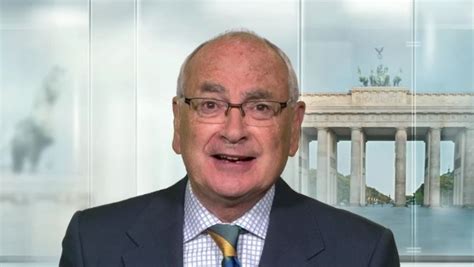A Quote by Francois Hollande
Related Quotes
Germany has become the economic heart of Europe because our leaders are weak. But Germany should never forget that France is Europe's political heart. What is happening here today foreshadows what will happen in the rest of Europe in the coming years: the great return of the nation-state, which they wanted to obliterate.
Germany will always do the minimum to preserve the euro. Doing the minimum, though, will perpetuate the situation where the debtor countries in Europe have to pay tremendous premiums to refinance their debt. The result will be a Europe in which Germany is seen as an imperial power that will not be loved and admired by the rest of Europe - but hated and resisted, because it will perceived as an oppressive power.
If I were a German today, I would be proud, proud but also worried. I would be proud of the magnificent achievement of rebuilding my country, entrenching democracy and assuming the undoubtedly preponderant position in Europe. But a united Germany can't and won't subordinate its national interests in economic or in foreign policy to those of the Community indefinitely. Germany's new pre-eminence is a fact - and its power is a problem - as much for Germans as for the rest of Europe.
Our international role depends on a strong Europe and a strong Europe depends on France's ability to share leadership with others, including Germany. If France is economically weak and doesn't carry out reforms, it is no longer credible. Europe's position on the global stage is thus weakened. I would like to change all that. France needs a strong Germany and a strong chancellor. But Germany also needs a strong France.
The largest weight is now on Germany's shoulders. Chancellor Merkel must continue to convince people of the EU's importance; she must spearhead the effort to redefine the EU. In order to do this, Germany must become a muscular democracy. It needs to shoulder far more responsibility for the physical security of Europe, especially Eastern Europe and the Mediterranean. So far, unfortunately, Germany has taken the lead in disrespecting Europe's borders by opening its doors to more than a million refugees and migrants.
Italy is the fourth-largest economy in Europe and the eighth-largest economy in the world, and its banking system is collapsing. And Germany is desperate. It must maintain its standard of living. It can only do that with exports and Deutsche Bank is very exposed to Italian debt. But so is the rest of Europe.
You're thinking of Europe as Germany and France. I don't. I think that's old Europe. If you look at the entire NATO Europe today, the center of gravity is shifting to the east. And there are a lot of new members. And if you just take the list of all the members of NATO and all of those who have been invited in recently -- what is it? Twenty-six, something like that? -- you're right. Germany has been a problem, and France has been a problem.
History has often showed us the strength of the forces that are unleashed by the yearning for freedom. It moved people to overcome their fears and openly confront dictators such as in East Germany and Eastern Europe about 22 years ago... The yearning for freedom cannot be contained by walls for long. It was this yearning that brought down the Iron Curtain that divided Germany and Europe, and indeed the world, into two blocs.









































